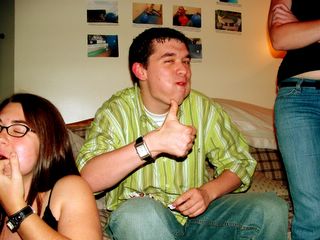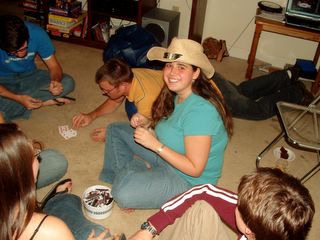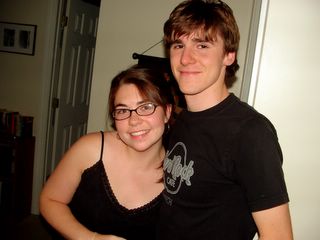Sep 30, 2005
Sep 27, 2005
Sep 19, 2005
Sep 12, 2005
Sep 6, 2005
When I was about 7 years old, tramping to school in the calm grey
weather of Denver, Colorado, college was an eternity away. In fact,
there was this 12-year-old kid at the end of the street—well, I call
him "kid" now; at the time, he seemed as grown up and free as I would
ever be. His name was Kevin, and he made me certain I wanted to be 12
when I grew up.
When I finally made it to my twelfth birthday, I thought of it as my
last year of childhood. The teenage years were upon me.
At thirteen, I couldn't wait to drive.
Sixteen rolled around, and suddenly those eighteen-year-old guys with
thick facial hair and girlfriends seemed the most serious and
authoritative people in the world.
Eighteen, and for a brief moment I thought I had arrived—I was
enrolled in the draft. The moment passed when Gillette sent me a razor
for my eighteenth birthday and I still had no facial reason to even
open the package.
That awkward, in-between twentieth year—not yet full-fledged adult and
yet no longer teenager—flew by in seconds.
Saturday, now at age 21, I attended the wedding of my close friend Ben
Williams, who is 27, and marveled at how young I still feel.
Twenty-one, a senior in college, working two jobs and living in a
house, you'd think I'd be past looking ahead all the time.
But I still catch myself looking at the Ben Williamses in my life and
thinking, "Someday, I'll grow up. Someday, I'll be complete."
It seems the habits of seven-year-olds die hard. I'm still finding
twelve-year-old Kevins to aspire toward.
I don't think I can argue that looking ahead in life is wrong, per se,
but I will attempt to convince you that it's a big waste of time.
The first fallacy here is assuming that it is even possible to
"arrive" in life. It's a nice thought, but a few conversations with
even your oldest acquaintances will clarify the unfounded nature of
such a concept. It simply never happens, at least not in this life.
Another problem with this kind of thinking is that it causes us to
always be comparing ourselves with others. We find the Bens and Kevins
in our life and cling to the idea that if we just had what they had
(age, job, wife, whatever), we'd be complete.
This is a dangerous state of mind.
Always focusing on where we aren't keeps our attention from where we
are. You can't drive somewhere by focusing on the destination. You get
there by paying attention to the turns and street signs and road
rules.
Typically, the "Christian" remedy to our natural struggle with this
mindset is to remind ourselves that "we don't really arrive until we
get to heaven."
This is not, however, a true solution. It is merely a spiritualization
of the problem.
Thinking that heaven is the "arrival point" is a problem in two major ways.
First, it trivializes the journey, in the same way thinking that a
diploma is the only important thing at this point trivializes the many
things you will learn in college that will have nothing to do with
that little slip of paper. I fear that there are far too many of us
that would jump at the opportunity to take a pill and put the next few
years in fast forward, if it were possible.
Second, the "heaven-is-the-end" mindset trivializes heaven itself. I
hate to break it to you here, but there is no indication that you will
be perfect when you get to heaven. You will not "have arrived" when
you cross through those pearly gates.
Sinless, yes. Painless, sure. But omniscient? Omnipresent? Omnipotent?
No, nope, and not a chance.
And at the very least, if you are not omniscient, it will mean that
you've still got something to learn. And if you've still got something
to learn, then you're not "arrived," yet.
I wonder if it will be possible to be jealous of people that have been
in heaven longer than us, getting a head start on whatever it is we'll
be trying to figure out up there.
If you ask me, it seems the best thing to do is realize that this
whole thing's just one big long journey. You won't "arrive" when you
graduate, or when you get married, or get a house, or a career, or
retire, or even when you die.
Instead, look at it this way: we're just hitchhiking through life, and
at some point in the next 60 years or so we'll find ourselves, not at
the end of our journey, but rather joined bodily by the One who put us
on the journey in the first place.
This is how, I think, He is able to be both the Beginning and the End.
Because there really aren't any Beginnings or Ends. Just Him.
So if you're like me, and you just can't wait for whatever's coming
next in life, remember this: that thing you've been waiting for, it's
called Today.










